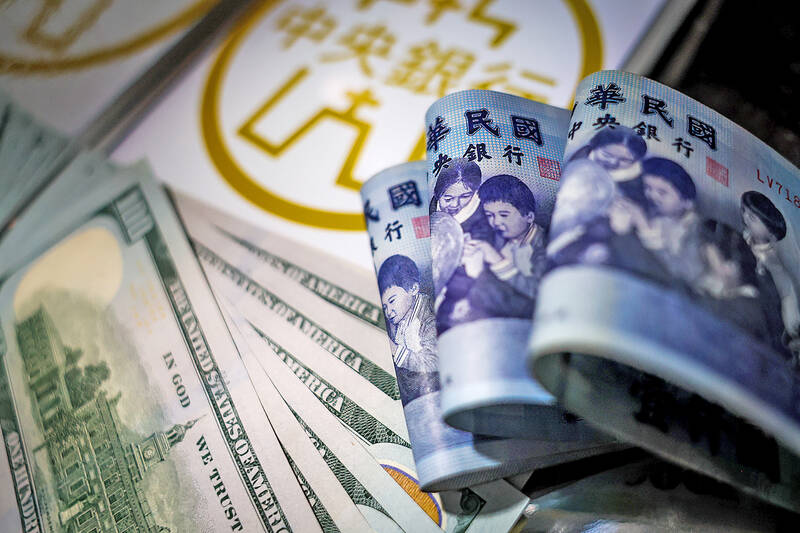Average regular monthly wages in the industrial and service sectors reached NT$47,426, rising 3.03 percent year-on-year to the highest level in 25 years thanks to the artificial intelligence (AI) boom, the Directorate-General of Budget, Accounting and Statistics (DGBAS) said yesterday.
The data suggested a 0.81 percent rise after adjustments for inflation, the fastest pickup in four years — indicating that wage growth has outpaced inflation, DGBAS Census Department Deputy Director Tan Wen-ling (譚文玲) said.
However, income disparity remains a concern, Tan said.

Photo: CNA
“A total of 69.77 percent of workers earned less than the average, the highest on record,” she said.
That widening gap had much to do with employees with extremely high pay pushing the average upward, Tan said.
Median regular wages, which are not skewed by extremely high or low wages, stood at NT$38,084 in the first quarter, a 2.98 percent increase from the same period a year earlier, the DGBAS said.
Taiwanese electronics suppliers have benefited from US technology titans’ fast-growing craze for AI capability, with overtime hours in March rising to 16.9 hours, the 10th consecutive month of gains, Tan said.
In the first quarter, overtime hours averaged 25.9 hours per month, the highest in 46 years, she added.
In March alone, the average regular monthly wage went up 3.15 percent from a year earlier to NT$47,525, while total compensations — including bonuses, performance-based commissions and overtime — climbed 3.09 percent to NT$55,123, DGBAS data showed.
Employees at restaurants and hotels reported below-average regular monthly pay, at NT$34,779, while people working in hair or beauty salons fared slightly better at NT$36,533 per month, the agency said.
By contrast, workers at financial institutions and insurance companies saw much higher regular monthly wages at NT$70,989, followed by content creators and telecommunication operators at NT$69,091, and technicians with professional backgrounds at NT$57,818, it said.
Investments in education seemed to pay off as well, as people who had higher education and degrees received better compensations, DGBAS said.
The median monthly wage for people with graduate degrees was NT$65,979, while those with university or junior college education reported an average wage of NT$40,353, it said.

To many, Tatu City on the outskirts of Nairobi looks like a success. The first city entirely built by a private company to be operational in east Africa, with about 25,000 people living and working there, it accounts for about two-thirds of all foreign investment in Kenya. Its low-tax status has attracted more than 100 businesses including Heineken, coffee brand Dormans, and the biggest call-center and cold-chain transport firms in the region. However, to some local politicians, Tatu City has looked more like a target for extortion. A parade of governors have demanded land worth millions of dollars in exchange

Hong Kong authorities ramped up sales of the local dollar as the greenback’s slide threatened the foreign-exchange peg. The Hong Kong Monetary Authority (HKMA) sold a record HK$60.5 billion (US$7.8 billion) of the city’s currency, according to an alert sent on its Bloomberg page yesterday in Asia, after it tested the upper end of its trading band. That added to the HK$56.1 billion of sales versus the greenback since Friday. The rapid intervention signals efforts from the city’s authorities to limit the local currency’s moves within its HK$7.75 to HK$7.85 per US dollar trading band. Heavy sales of the local dollar by

Taiwan Semiconductor Manufacturing Co’s (TSMC, 台積電) revenue jumped 48 percent last month, underscoring how electronics firms scrambled to acquire essential components before global tariffs took effect. The main chipmaker for Apple Inc and Nvidia Corp reported monthly sales of NT$349.6 billion (US$11.6 billion). That compares with the average analysts’ estimate for a 38 percent rise in second-quarter revenue. US President Donald Trump’s trade war is prompting economists to retool GDP forecasts worldwide, casting doubt over the outlook for everything from iPhone demand to computing and datacenter construction. However, TSMC — a barometer for global tech spending given its central role in the

An Indonesian animated movie is smashing regional box office records and could be set for wider success as it prepares to open beyond the Southeast Asian archipelago’s silver screens. Jumbo — a film based on the adventures of main character, Don, a large orphaned Indonesian boy facing bullying at school — last month became the highest-grossing Southeast Asian animated film, raking in more than US$8 million. Released at the end of March to coincide with the Eid holidays after the Islamic fasting month of Ramadan, the movie has hit 8 million ticket sales, the third-highest in Indonesian cinema history, Film